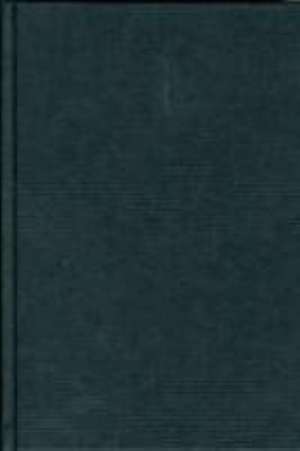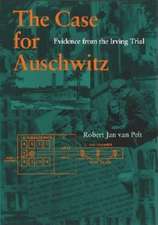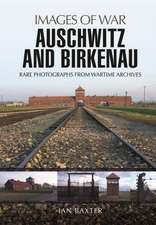Years of Persecution, Years of Extermination: Saul Friedlander and the Future of Holocaust Studies
Editat de Professor Christian Wiese, Dr Paul Bettsen Limba Engleză Hardback – 14 iun 2010
| Toate formatele și edițiile | Preț | Express |
|---|---|---|
| Paperback (1) | 415.53 lei 6-8 săpt. | |
| Bloomsbury Publishing – 14 iun 2010 | 415.53 lei 6-8 săpt. | |
| Hardback (1) | 836.31 lei 3-5 săpt. | |
| Bloomsbury Publishing – 14 iun 2010 | 836.31 lei 3-5 săpt. |
Preț: 836.31 lei
Preț vechi: 1069.35 lei
-22% Nou
Puncte Express: 1254
Preț estimativ în valută:
160.03€ • 171.13$ • 133.43£
160.03€ • 171.13$ • 133.43£
Carte disponibilă
Livrare economică 27 martie-10 aprilie
Preluare comenzi: 021 569.72.76
Specificații
ISBN-13: 9781441189370
ISBN-10: 1441189378
Pagini: 384
Dimensiuni: 156 x 234 x 33 mm
Greutate: 0.75 kg
Editura: Bloomsbury Publishing
Colecția Continuum
Locul publicării:London, United Kingdom
ISBN-10: 1441189378
Pagini: 384
Dimensiuni: 156 x 234 x 33 mm
Greutate: 0.75 kg
Editura: Bloomsbury Publishing
Colecția Continuum
Locul publicării:London, United Kingdom
Caracteristici
Provides a thorough, readable and critical response to the ideas raised in Friedlander's writing.
Cuprins
Introduction - Paul Betts and Christian Wiese / i.An Integrated History of the Holocaust: Possibilities and Challenges - Saul Friedlander / Part I: The Holocaust as a Narrative Problem / ii. Narrative Form and Historical Sensation: On Friedlander's TheYears of Extermination - Alon Confino / iii. Kaleidoscopic Writing: On Friedlander's The Years of Extermination: Nazi Germany and the Jews 1939-1945 - Dan Diner / iv. Friedlander, Holocaust Historiography and the Use of Testimony - Tony Kushner / v. Holocaust Perpetrators in Victims' Eyes - Mark Roseman / vi. Raul Hilberg and Saul Friedlander: Two Perspectives on the Holocaust - Michael Wildt / Part II: German Society and Redemptive Antisemitism / vii. National Socialism, Antisemitism and the 'Final Solution' - Peter Pulzer / viii. Speaking in Public about the Murder of the Jews: What did the Holocaust mean to the Germans? - Nicholas Stargardt / ix. An 'Indelible Stigma' : The Churches between Silence, Ideological Involvement, and Political Complicity - Christian Wiese / x. 'The Ethics of a Truth-Seeking Judge': Konrad Morgen, SS Judge and Corruption Expert - Raphael Gross / Part III: Mass Killings and Genocide / xi. Mass Killing and Genocide from 1914 to 1945 - Alan Kramer / xii. Redemptive Antisemitism and the Imperialist Imaginary - A.Dirk Moses / xiii. Murder amidst Collapse: Explaining the Violence of the Last Months of the Third Reich - Richard Bessel / xiv. Opportunistic Killings and Plunder of Jews by their Neighbours: A Norm or an Exception in German Occupied Europe?- Jan T Gross / Part IV: Perspectives / xv. No End in Sight? The Ongoing Challenge of producing an Integrated History of the Holocaust - Doris L. Bergen / xvi. Towards an Integrated History of the Holocaust: Masculinity, Femininity and Genocide - Zoe V. Waxman / xvii.The History of the Holocaust: Multiple Actors, Diverse Motives, Contradictory Developments and Disparate (Re)actions - Wolf Gruner / xviii. Nazi Germany and the Jews and the Future of Holocaust Historiography - Dan Stone.
Recenzii
This collection of essays provides an exceptional compendium of informed and thought-provoking commentaries both justifiably honoring and critically assessing a masterwork of history, memory, and mourning that will, for the foreseeable future, be crucial in shaping the study and prompting newer understandings of the "final solution" and extreme historical processes in general. The reader...will be consistently challenged to rethink pre-existing approaches and interpretations.
Saul Friedländer is rightly regarded as one of the very most important scholars of the Holocaust, a superb narrative historian and a hugely sensitive theoretician of his discipline. Christian Wiese and Paul Betts are to be congratulated on constructing a fitting monument to his influence, bringing together a wonderful cast of scholars who have achieved prominence in their own right...Wide-ranging and intelligent, the volume is coherent and its essays concise: it demands a wide audience because it will benefit a spectrum of disciplines, and readers from the uninitiated to the expert.
'This is a rich collection on the state of Holocaust studies.'
Saul Friedländer is rightly regarded as one of the very most important scholars of the Holocaust, a superb narrative historian and a hugely sensitive theoretician of his discipline. Christian Wiese and Paul Betts are to be congratulated on constructing a fitting monument to his influence, bringing together a wonderful cast of scholars who have achieved prominence in their own right...Wide-ranging and intelligent, the volume is coherent and its essays concise: it demands a wide audience because it will benefit a spectrum of disciplines, and readers from the uninitiated to the expert.
'This is a rich collection on the state of Holocaust studies.'







